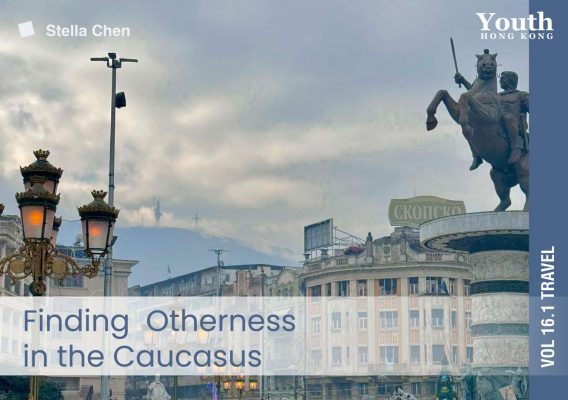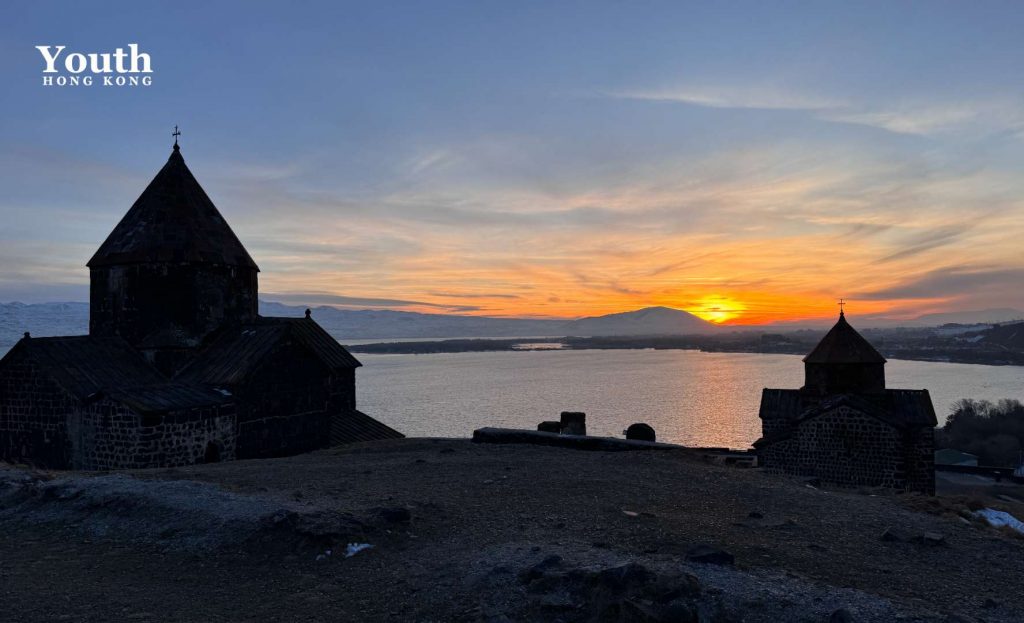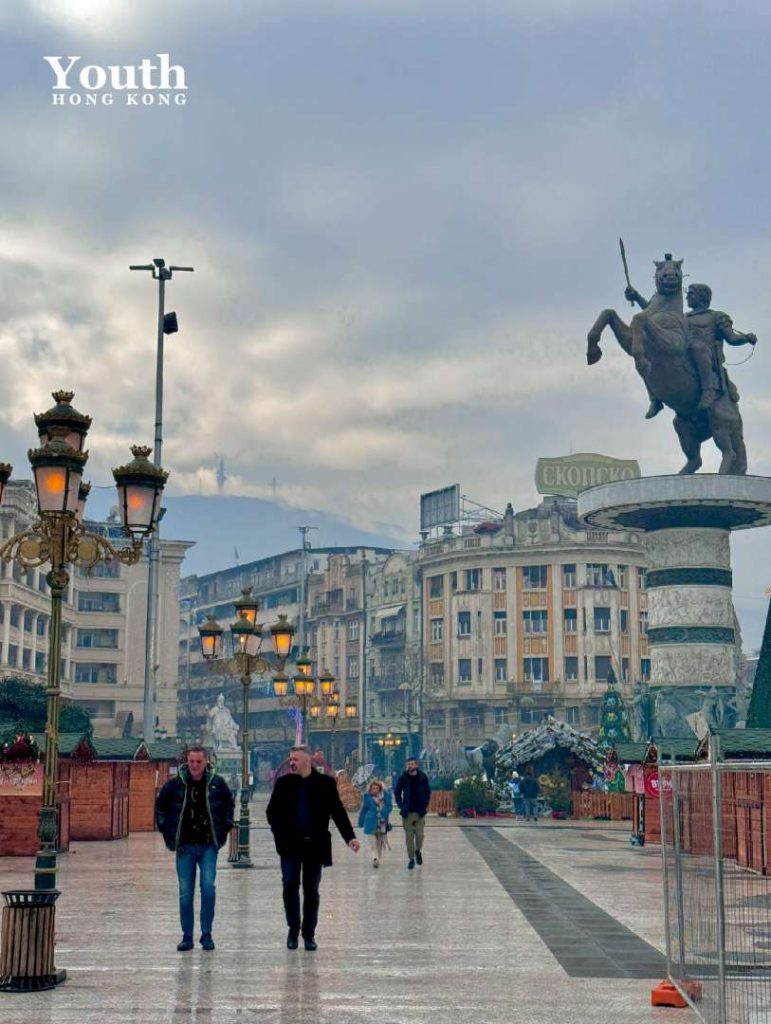//vol.16-1 Viewpoint: Travel
Finding “Otherness” in the Caucasus
By Stella Chen
Last Christmas, I decided to escape the sub-tropical climate of Hong Kong and embark on a journey to the enchanting South Caucasus and Balkans Peninsula. From Georgia to Armenia, and then to North Macedonia, this trip was a captivating mix of freezing temperatures, awe-inspiring sights and most importantly, a journey in search of otherness.
Before arriving in Georgia and Armenia, my perception of these countries was largely influenced by my understanding of Russian literature. I expected to encounter a sombre and reserved atmosphere, given their historical connection to Russia and their struggles towards independence against oppression.
However, Tbilisi, the capital of Georgia, completely surprised me with its composed yet chaotic cityscape. The old town exuded tranquillity with its cobblestone streets, ancient fortresses, and stone churches. But beyond that, the city pulsated with a vibrant, hippy spirit, where former Soviet factories had been transformed into bustling nightlife spots, artist studios, co-working spaces, and trendy hostels.
I had a fun stay at a boutique hotel called Blueberry Nights in downtown Tbilisi. This hotel, inspired by the Hong Kong film director Wong Kar-wai’s movie of the same name, caught me off guard with its thematic colour scheme that perfectly mirrored the film’s aesthetic. Behind the buzzing pink neon lights, this hotel showcases independent films, as well as a selection of records from local artists in its private theatres. What a delightful surprise to find a connection between Hong Kong culture and this lesser-known land thousands of miles away.
Despite the end of Georgia’s connection with communism three decades ago, the city still bore the remnants of its Soviet past. The abundance of striking Soviet architecture became one of the most exciting aspects of my trip, as I embarked on a quest to discover Tbilisi’s brutalist buildings. Whether still in use or abandoned, these buildings were scattered throughout the city, showcasing their exposed raw concrete and monochrome colour palette. I found myself immersed in the silent yet spectacular minimalist architectural philosophy, with its sharp and bold geometry.
One of the highlights of my exploration was a visit to a Soviet-era apartment in the suburbs. What made this apartment particularly interesting was the 「sky bridge」 that connected different apartments, allowing residents to take an elevator up and walk across to a hilltop grocery store. The building manager, an old and kind lady who had worked there for over two decades, introduced herself to me. To my surprise, this lady, who adopted two cats, had also served as a sniper soldier during the Abkhazia War. This encounter made the city even more magical to me, as it highlighted how an ordinary person with an ordinary job could have an extraordinary past.
Apart from the people and the scenery, the unique Christmas vibe in the region also captivated me. In Georgia, Armenia, and North Macedonia, the majority of the population practises Orthodox Christianity, celebrating Christmas on 7 January instead of 25 December. Thanks to their religious traditions, my joy of Christmas extended from Hong Kong to these lands. Compared to the more commercialised Christmas setting in Hong Kong, where it’s primarily a time for friends』 gatherings and romantic dates, the Christmas atmosphere in the Caucasus region and North Macedonia felt more family-oriented and culturally vibrant, from families choosing the white traditional Georgian Christmas tree, cars getting decorated with reindeer antlers, to children cheering on colourful train rides going across different Christmas market booths in parks.
“We came to a foreign land to seek the other, but ended up discovering ourselves as the other.”
Being the 「other」 in another country was a unique experience. Although I had spent a considerable amount of time living, studying, and working away from home, the sense of being an outsider on this trip felt entirely new. I jokingly complained to my friends that these countries were the only places I had travelled to without any Chinese restaurants or Asian supermarkets. After two weeks in the Caucasus, my craving for Asian food reached its peak, and I found myself walking to more than 10 supermarkets in search of Asian ramen or cup noodles to satisfy my homesickness.
Unfortunately, my hunt proved futile. I had been to the Sahara Desert in Morocco and Machu Picchu in Peru, and even in those far-flung places, I had always come across Chinese restaurants and Chinatowns. Although Chinese food is not my first choice when travelling, it wasn’t until I faced the absence of Chinese and Asian food that I realised how the presence of a Chinatown, a Chinese restaurant, or a silent but present Chinese community gives me a sense of belonging.
Being in homogeneous nations during this trip provided me with a new understanding of what it’s like to be the 「other.」 I encountered language barriers and often had to rely on sign language, even for basic questions like finding milk in a supermarket. I had to read between the lines, interpret the locals』 tone and observe how they communicated with other locals to discern if they were angry, frustrated, or potentially trying to scam tourists, or if it was simply their natural way of conversation – loud and assertive.
People would stop and stare, tapping on my shoulder to offer assistance in broken English if they noticed me struggling to read or find something in a bookstore. Everywhere I went – whether it was on the street, in a restaurant, or even a nail salon – strangers would strike up random conversations with me out of curiosity about my distinct appearance and height. When I mentioned that I am from China, they would eagerly share their knowledge and experiences of travelling to other Asian countries, like Japan, which is the farthest place they have been in Asia, hoping to bridge the gap between us, which is funny but also heartwarming.
Although it sometimes feels a bit alienating to stand out, being the 「other」 is always a reflective experience. It allows you to observe and immerse yourself in a different culture, with its unique customs, food, language, and mindset. In doing so, you gain a new perspective and lens through which to view your life even in the land you are familiar with. Additionally, you become more empathetic towards communities in your city who may face similar language and cultural barriers, as you realise the challenges they encounter.
As the French-American writer Anaïs Nin said, “We travel, some of us forever, to seek other states, other lives, other souls.” Maybe that’s the thrill of visiting foreign lands – to seek the other, and ultimately find ourselves in being the other. ■




